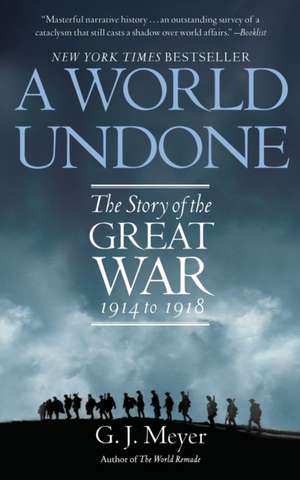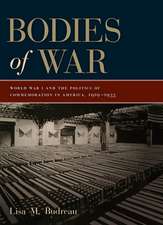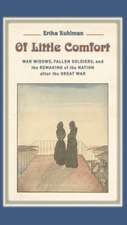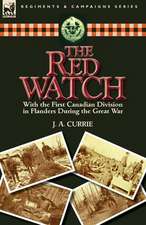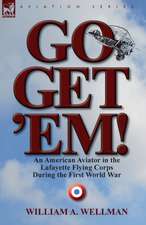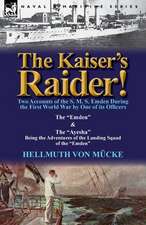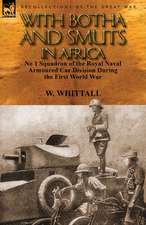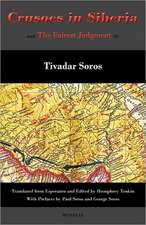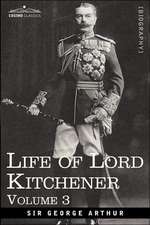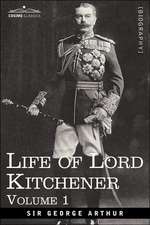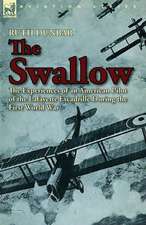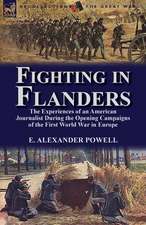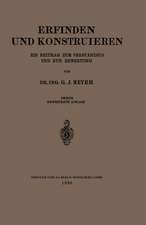A World Undone: The Story of the Great War 1914 to 1918
Autor G. J. Meyeren Limba Engleză Paperback – 30 apr 2007
The First World War is one of history’s greatest tragedies. In this remarkable and intimate account, author G. J. Meyer draws on exhaustive research to bring to life the story of how the Great War reduced Europe’s mightiest empires to rubble, killed twenty million people, and cracked the foundations of the world we live in today.
From the Hardcover edition.
Preț: 135.27 lei
Nou
Puncte Express: 203
Preț estimativ în valută:
25.88€ • 27.68$ • 21.58£
25.88€ • 27.68$ • 21.58£
Carte disponibilă
Livrare economică 27 martie-10 aprilie
Preluare comenzi: 021 569.72.76
Specificații
ISBN-13: 9780553382402
ISBN-10: 0553382403
Pagini: 777
Ilustrații: MAPS AND PHOTOS THROUGHOUT
Dimensiuni: 132 x 208 x 38 mm
Greutate: 0.68 kg
Editura: Delacorte Press
ISBN-10: 0553382403
Pagini: 777
Ilustrații: MAPS AND PHOTOS THROUGHOUT
Dimensiuni: 132 x 208 x 38 mm
Greutate: 0.68 kg
Editura: Delacorte Press
Notă biografică
G. J. Meyer is a professional writer whose bylines have appeared in the New York Times, Los Angeles Times, the Boston Globe, Harper’s, and many other newspapers and magazines. While working for the St. Louis Post-Dispatch, he was awarded a Nieman Fellowship by Harvard University. He is the author of two nonfiction books, The Memphis Murders, recipient of an Edgar Award for Nonfiction, and Executive Blues. Meyer lives in New York City.
From the Hardcover edition.
From the Hardcover edition.
Extras
Chapter 1
June 28:
The Black Hand Descends
"It's nothing. It's nothing."
--Archduke Franz Ferdinand
Thirty-four long, sweet summer days separated the morning of June 28, when the heir to the Austro-Hungarian Empire was shot to death, from the evening of August 1, when Russia's foreign minister and Germany's ambassador to Russia fell weeping into each other's arms and what is rightly called the Great War began.
On the morning when the drama opened, Archduke Franz Ferdinand was making an official visit to the city of Sarajevo in the province of Bosnia, at the southernmost tip of the Austro-Hungarian domains. He was a big, beefy man, a career soldier whose intelligence and strong will usually lay concealed behind blunt, impassive features and eyes that, at least in his photographs, often seemed cold and strangely empty. He was also the eldest nephew of the Hapsburg emperor Franz Joseph and therefore--the emperor's only son having committed suicide--heir to the imperial crown. He had come to Bosnia in his capacity as inspector general of the Austro-Hungarian armies, to observe the summer military exercises, and he had brought his wife, Sophie, with him. The two would be observing their fourteenth wedding anniversary later in the week, and Franz Ferdinand was using this visit to put Sophie at the center of things, to give her a little of the recognition she was usually denied.
Back in the Hapsburg capital of Vienna, Sophie was, for the wife of a prospective emperor, improbably close to being a nonperson. At the turn of the century the emperor had forbidden Franz Ferdinand to marry her. She was not of royal lineage, was in fact a mere countess, the daughter of a noble but impoverished Czech family. As a young woman, she had been reduced by financial need to accepting employment as lady-in-waiting to an Austrian archduchess who entertained hopes of marrying her own daughter to Franz Ferdinand. All these things made Sophie, according to the rigid protocols of the Hapsburg court, unworthy to be an emperor's consort or a progenitor of future rulers. The accidental discovery that she and Franz Ferdinand were conducting a secret if chaste romance--that he had been regularly visiting the archduchess's palace not to court her daughter but to see a lowly and thirtyish member of the household staff--sparked outrage, and Sophie had to leave her post. But Franz Ferdinand continued to pursue her. In his youth he had had a long struggle with tuberculosis, and perhaps his survival had left him determined to live his private life on his own terms. Uninterested in any of the young women who possessed the credentials to become his bride, he had remained single into his late thirties. The last two years of his bachelorhood turned into a battle of wills with his uncle the emperor over the subject of Sophie Chotek.
Franz Joseph finally tired of the deadlock and gave his consent. What he consented to, however, was a morganatic marriage, one that would exclude Sophie's descendants from the succession. And so on June 28, 1900, fourteen years to the day before his visit to Sarajevo, Franz Ferdinand appeared as ordered in the Hapsburg monarchy's Secret Council Chamber. In the presence of the emperor, the Cardinal Archbishop of Vienna, the Primate of Hungary, all the government's principal ministers, and all the other Hapsburg archdukes, he solemnly renounced the Austro-Hungarian throne on behalf of any children that he and Sophie might have and any descendants of those children. (Sophie was thirty-two, which in those days made her an all but hopeless spinster.) When the wedding took place three days later, only Franz Ferdinand's mother and sister, out of the whole huge Hapsburg family, attended. Even Franz Ferdinand's brothers, the eldest of whom was a notorious libertine, self-righteously stayed away. The marriage turned out to be a happy one all the same, in short order producing a daughter and two sons whom the usually stiff Franz Ferdinand loved so unreservedly that he would play with them on the floor in the presence of astonished visitors. But at court Sophie was relentlessly snubbed. She was not permitted to ride with her husband in royal processions or to sit near him at state dinners. She could not even join him in his box at the opera. When he, as heir, led the procession at court balls, she was kept far back, behind the lowest ranking of the truly royal ladies.
But here in Bosnia, a turbulent border province, the rules of Vienna could be set aside. Here in Sarajevo, Franz Ferdinand and Sophie could appear together in public as royal husband and wife. It was a rare experience, and they were enjoying it as much as any pair of small-town shopkeepers on their first vacation in years. They were staying in the nearby seaside resort town of Bad Ilidz, and on Saturday they had browsed the local antique markets. They had started Sunday with mass in an improvised chapel at their hotel, after which the archduke sent a telegram to the children, Sophie, Max, and Ernst. Momma and Poppa were well, the wire said. Momma and Poppa were looking forward to getting home on Tuesday.
And now on this brilliant morning, the air crisp and clear after a week of rain and chill, the streets lined with people some of whom cheered and some of whom merely looked on in silence, Sophie was seated beside the archduke in an open car as they rode toward the town hall. They looked less imperial than like characters out of a comic opera: an overweight middle-aged pair, Franz Ferdinand faintly ridiculous in an ornate military headpiece and a field marshal's tunic that stretched too tight across his ample torso, Sophie's plump face smiling cheerily under a broad bonnet and the dainty parasol that, even in the moving car, she held above her head.
Suddenly there was a loud crack: the sound, as police investigators would later determine, of the percussion cap on a Serbian-made pocket bomb being struck against a lamppost. A small dark object was seen flying through the air: the bomb, thrown by someone in the crowd. It was on target, but the driver of the royal car saw it coming and accelerated, so that it fell inches behind the archduke and his wife. Franz Ferdinand too saw it, swung at it with his arm, and deflected it farther to the rear. It exploded with a shattering noise as the car sped off, damaging the next vehicle in the procession and injuring several people. A tiny fragment of shrapnel grazed Sophie's neck.
In the crowds along the route of the motorcade that day were six young men who had traveled to Sarajevo for the purpose of killing the archduke. Five of them, including the one who had thrown the bomb, were Bosnian Serb teenagers--youths born and raised in Bosnia but of Serbian descent. All five were sick with tuberculosis, curiously enough, and all were members of Young Bosnia, a radical patriotic organization linked to and supported by a deeply secret Serb nationalist group formally called Union or Death but known to its members as the Black Hand. Though the Black Hand had been active for years, Austria-Hungary's intelligence services still knew nothing of its existence. Its purpose was the expansion of the Kingdom of Serbia, a smallish and ambitious young country adjacent to Bosnia, so that all the Serbs of the Balkans could be united. Its ultimate goal was the creation of a Greater Serbia that would include Bosnia, and its members were prepared to use terrorism to achieve that goal. The assassins of June 28 had been assembled just across the border in the Serbian capital of Belgrade, armed with bombs and Belgian revolvers, and slipped into Sarajevo well in advance of the archduke's arrival.
June 28, as it happened, was an awkward day for a Hapsburg to be visiting Bosnia. It was St. Vitus Day, which for more than five hundred years had been an occasion of mourning for the Serbs. On St. Vitus Day in 1389 a Serbian kingdom that had flourished through the Middle Ages was defeated by the Ottoman Turks at the Battle of Kosovo, on the so-called Field of Blackbirds. The Serb army was not merely vanquished but slaughtered. Soon afterward the kingdom ceased to exist. The Serbs became subjects--slaves, really--of their savagely harsh Turkish conquerors. Kosovo was avenged in 1912, when the Turks were driven out of the Balkans at last, but it would never be forgotten--certainly not while so many Serbs were still under alien rule. There could be no better day than this one to strike a blow against the oppressors--which now meant a blow against the Hapsburgs, the Turks being gone from the scene.
Between the throwing of the bomb and the motorcade's arrival at the town hall, the car carrying Franz Ferdinand and Sophie drove past three more members of the gang. They were armed but did nothing. Later two of them, after being arrested, made excuses for their failure to act. The third, probably the most truthful, said he had lost his nerve.
After a standard ceremonial welcome--the mayor, absurdly, didn't deviate from a script declaring that everyone in Sarajevo honored the archduke and was delighted by this visit--Franz Ferdinand announced a change in his itinerary. He insisted on going to the hospital where the people injured by the bomb had been taken. It was the right Hapsburg gesture, a demonstration of concern for servants of the crown. Franz Ferdinand asked Sophie to stay behind, out of any possible danger. She refused, saying that her place was with him. This did not seem reckless. The military governor of Bosnia, who was riding in the same car with the couple that morning, had already declared his confidence that there would be no further trouble. If he knew anything about the Serb fanatics, he said, it was that they were capable of only one assassination attempt per day.
The motorcade set out once again. The route originally planned by the authorities was still cleared of traffic, and the lead driver mistakenly took it rather than the road to the hospital. The others followed. They passed still another would-be assassin, but he too did nothing. When the governor, seated in front of Franz Ferdinand and Sophie, discovered that they were going the wrong way, he ordered their driver to stop. The driver brought the car to a halt, shifted gears, and prepared to turn around. By a coincidence that has reverberated down the decades, he had stopped less than five feet from Gavrilo Princip, nineteen years old, the one remaining member of the assassination gang and its leader. Princip pulled out his revolver, pointed it at the stopped car, and fired twice.
Husband and wife remained upright and calm in their seats. The governor, seeing no signs of injury and thinking that they must have escaped harm, shouted again at the driver, telling him to turn around.
Suddenly a thin stream of blood came spurting out of Franz Ferdinand's mouth.
"For heaven's sake!" cried Sophie. "What's happened to you?" Then she slumped over, her head falling between her husband's knees. The military governor thought she had fainted, but somehow the archduke knew better.
"Sophie dear, Sophie dear, don't die!" he called. "Stay alive for our children!" Other members of the party surrounded him, struggling to open his tunic to see where he had been shot. "It's nothing," he told them weakly. "It's nothing."
Gavrilo Princip meanwhile tried to shoot himself in the head but was stopped by a member of the crowd. In the struggle that followed, he managed to swallow his vial of the cyanide that all the members of the gang had been given. The cyanide was old: it would make him vomit but not kill him. He was quickly captured.
Within minutes Franz Ferdinand and Sophie were both dead. (Princip, in prison, would express regret at Sophie's death, which he had not intended; the bullet that killed her had passed through the door of the car before striking her in the groin and severing an artery.) The news caused a sensation, of course, but there was little sense of crisis. In Vienna the eighty-three-year-old emperor, Franz Joseph, seemed almost grateful when he heard. He had long regarded Franz Ferdinand as a nuisance, not only because of the marriage problem but also because of the archduke's unpleasantly advanced ideas. (He had even wanted, ironically, to give the Hapsburgs' Slavic subjects, the Bosnian Serbs included, a voice in the governance of the empire.) Apparently Franz Joseph believed at first that the Sarajevo murders had simplified things, had even put them right. "A higher power," his private secretary would remember him saying, "has re-established the order which I, alas, could not preserve."
Germany's Kaiser Wilhelm II, when he learned of the assassination, ended his sailing vacation off the coast of Norway and headed for home. He did so more because he and the archduke had been friends than because he foresaw an emergency; he and his wife had been guests at Franz Ferdinand and Sophie's country estate just weeks before.
From his royal yacht the Standart, Tsar Nicholas II of Russia declared three weeks of mourning in honor of the slain archduke. Beyond that he showed little interest; he had other things on his mind. His ten-year-old only son had a few days earlier twisted his ankle in jumping aboard the Standart for a family cruise in the Gulf of Finland. The injury activated the hemophilia that the boy had inherited from his mother, who in turn had inherited it from her grandmother, Queen Victoria of England. By June 28 he was in intense pain from internal bleeding. His parents, not for the first time and not for the last, feared for his survival.
The murders aroused little interest in Britain and France. Both countries were focused on other stories, London on a crisis over Ireland, Paris on a sensational murder trial that combined sex with political scandal. And assassinations were not unusual in those days. In the two decades before 1914, presidents of the United States, France, Mexico, Guatemala, Uruguay, and the Dominican Republic had been murdered. So had prime ministers of Russia, Spain, Greece, Bulgaria, Persia, and Egypt, and kings, queens, and empresses of Austria, Italy, Serbia, Portugal, and Greece. People had grown accustomed to such things and to expecting that their consequences would not be terribly serious.
Across the Atlantic in the United States, yet another killing of people no one had ever heard of in a place no one had ever heard of could hardly have seemed less important. President Woodrow Wilson had only somewhat more interest in European affairs than most of his fellow citizens, though he was inclined to believe that he might be the man to enlighten the Old World and save it from its foolish ways. During the summer his personal emissary, a Texan who styled himself "Colonel" Edward House despite never having served in any military capacity, spent two months visiting the capitals of the great powers and conferring with some of their most important men. "My purpose," House confided to his diary, perhaps somewhat smugly, "was to plant the seeds of peace." What he found, he reported to Wilson, was "militarism run stark mad. Unless someone acting for you [it is not difficult to guess who he thought that someone might be] can bring about a different understanding, there is some day to be an awful cataclysm."
From the Hardcover edition.
June 28:
The Black Hand Descends
"It's nothing. It's nothing."
--Archduke Franz Ferdinand
Thirty-four long, sweet summer days separated the morning of June 28, when the heir to the Austro-Hungarian Empire was shot to death, from the evening of August 1, when Russia's foreign minister and Germany's ambassador to Russia fell weeping into each other's arms and what is rightly called the Great War began.
On the morning when the drama opened, Archduke Franz Ferdinand was making an official visit to the city of Sarajevo in the province of Bosnia, at the southernmost tip of the Austro-Hungarian domains. He was a big, beefy man, a career soldier whose intelligence and strong will usually lay concealed behind blunt, impassive features and eyes that, at least in his photographs, often seemed cold and strangely empty. He was also the eldest nephew of the Hapsburg emperor Franz Joseph and therefore--the emperor's only son having committed suicide--heir to the imperial crown. He had come to Bosnia in his capacity as inspector general of the Austro-Hungarian armies, to observe the summer military exercises, and he had brought his wife, Sophie, with him. The two would be observing their fourteenth wedding anniversary later in the week, and Franz Ferdinand was using this visit to put Sophie at the center of things, to give her a little of the recognition she was usually denied.
Back in the Hapsburg capital of Vienna, Sophie was, for the wife of a prospective emperor, improbably close to being a nonperson. At the turn of the century the emperor had forbidden Franz Ferdinand to marry her. She was not of royal lineage, was in fact a mere countess, the daughter of a noble but impoverished Czech family. As a young woman, she had been reduced by financial need to accepting employment as lady-in-waiting to an Austrian archduchess who entertained hopes of marrying her own daughter to Franz Ferdinand. All these things made Sophie, according to the rigid protocols of the Hapsburg court, unworthy to be an emperor's consort or a progenitor of future rulers. The accidental discovery that she and Franz Ferdinand were conducting a secret if chaste romance--that he had been regularly visiting the archduchess's palace not to court her daughter but to see a lowly and thirtyish member of the household staff--sparked outrage, and Sophie had to leave her post. But Franz Ferdinand continued to pursue her. In his youth he had had a long struggle with tuberculosis, and perhaps his survival had left him determined to live his private life on his own terms. Uninterested in any of the young women who possessed the credentials to become his bride, he had remained single into his late thirties. The last two years of his bachelorhood turned into a battle of wills with his uncle the emperor over the subject of Sophie Chotek.
Franz Joseph finally tired of the deadlock and gave his consent. What he consented to, however, was a morganatic marriage, one that would exclude Sophie's descendants from the succession. And so on June 28, 1900, fourteen years to the day before his visit to Sarajevo, Franz Ferdinand appeared as ordered in the Hapsburg monarchy's Secret Council Chamber. In the presence of the emperor, the Cardinal Archbishop of Vienna, the Primate of Hungary, all the government's principal ministers, and all the other Hapsburg archdukes, he solemnly renounced the Austro-Hungarian throne on behalf of any children that he and Sophie might have and any descendants of those children. (Sophie was thirty-two, which in those days made her an all but hopeless spinster.) When the wedding took place three days later, only Franz Ferdinand's mother and sister, out of the whole huge Hapsburg family, attended. Even Franz Ferdinand's brothers, the eldest of whom was a notorious libertine, self-righteously stayed away. The marriage turned out to be a happy one all the same, in short order producing a daughter and two sons whom the usually stiff Franz Ferdinand loved so unreservedly that he would play with them on the floor in the presence of astonished visitors. But at court Sophie was relentlessly snubbed. She was not permitted to ride with her husband in royal processions or to sit near him at state dinners. She could not even join him in his box at the opera. When he, as heir, led the procession at court balls, she was kept far back, behind the lowest ranking of the truly royal ladies.
But here in Bosnia, a turbulent border province, the rules of Vienna could be set aside. Here in Sarajevo, Franz Ferdinand and Sophie could appear together in public as royal husband and wife. It was a rare experience, and they were enjoying it as much as any pair of small-town shopkeepers on their first vacation in years. They were staying in the nearby seaside resort town of Bad Ilidz, and on Saturday they had browsed the local antique markets. They had started Sunday with mass in an improvised chapel at their hotel, after which the archduke sent a telegram to the children, Sophie, Max, and Ernst. Momma and Poppa were well, the wire said. Momma and Poppa were looking forward to getting home on Tuesday.
And now on this brilliant morning, the air crisp and clear after a week of rain and chill, the streets lined with people some of whom cheered and some of whom merely looked on in silence, Sophie was seated beside the archduke in an open car as they rode toward the town hall. They looked less imperial than like characters out of a comic opera: an overweight middle-aged pair, Franz Ferdinand faintly ridiculous in an ornate military headpiece and a field marshal's tunic that stretched too tight across his ample torso, Sophie's plump face smiling cheerily under a broad bonnet and the dainty parasol that, even in the moving car, she held above her head.
Suddenly there was a loud crack: the sound, as police investigators would later determine, of the percussion cap on a Serbian-made pocket bomb being struck against a lamppost. A small dark object was seen flying through the air: the bomb, thrown by someone in the crowd. It was on target, but the driver of the royal car saw it coming and accelerated, so that it fell inches behind the archduke and his wife. Franz Ferdinand too saw it, swung at it with his arm, and deflected it farther to the rear. It exploded with a shattering noise as the car sped off, damaging the next vehicle in the procession and injuring several people. A tiny fragment of shrapnel grazed Sophie's neck.
In the crowds along the route of the motorcade that day were six young men who had traveled to Sarajevo for the purpose of killing the archduke. Five of them, including the one who had thrown the bomb, were Bosnian Serb teenagers--youths born and raised in Bosnia but of Serbian descent. All five were sick with tuberculosis, curiously enough, and all were members of Young Bosnia, a radical patriotic organization linked to and supported by a deeply secret Serb nationalist group formally called Union or Death but known to its members as the Black Hand. Though the Black Hand had been active for years, Austria-Hungary's intelligence services still knew nothing of its existence. Its purpose was the expansion of the Kingdom of Serbia, a smallish and ambitious young country adjacent to Bosnia, so that all the Serbs of the Balkans could be united. Its ultimate goal was the creation of a Greater Serbia that would include Bosnia, and its members were prepared to use terrorism to achieve that goal. The assassins of June 28 had been assembled just across the border in the Serbian capital of Belgrade, armed with bombs and Belgian revolvers, and slipped into Sarajevo well in advance of the archduke's arrival.
June 28, as it happened, was an awkward day for a Hapsburg to be visiting Bosnia. It was St. Vitus Day, which for more than five hundred years had been an occasion of mourning for the Serbs. On St. Vitus Day in 1389 a Serbian kingdom that had flourished through the Middle Ages was defeated by the Ottoman Turks at the Battle of Kosovo, on the so-called Field of Blackbirds. The Serb army was not merely vanquished but slaughtered. Soon afterward the kingdom ceased to exist. The Serbs became subjects--slaves, really--of their savagely harsh Turkish conquerors. Kosovo was avenged in 1912, when the Turks were driven out of the Balkans at last, but it would never be forgotten--certainly not while so many Serbs were still under alien rule. There could be no better day than this one to strike a blow against the oppressors--which now meant a blow against the Hapsburgs, the Turks being gone from the scene.
Between the throwing of the bomb and the motorcade's arrival at the town hall, the car carrying Franz Ferdinand and Sophie drove past three more members of the gang. They were armed but did nothing. Later two of them, after being arrested, made excuses for their failure to act. The third, probably the most truthful, said he had lost his nerve.
After a standard ceremonial welcome--the mayor, absurdly, didn't deviate from a script declaring that everyone in Sarajevo honored the archduke and was delighted by this visit--Franz Ferdinand announced a change in his itinerary. He insisted on going to the hospital where the people injured by the bomb had been taken. It was the right Hapsburg gesture, a demonstration of concern for servants of the crown. Franz Ferdinand asked Sophie to stay behind, out of any possible danger. She refused, saying that her place was with him. This did not seem reckless. The military governor of Bosnia, who was riding in the same car with the couple that morning, had already declared his confidence that there would be no further trouble. If he knew anything about the Serb fanatics, he said, it was that they were capable of only one assassination attempt per day.
The motorcade set out once again. The route originally planned by the authorities was still cleared of traffic, and the lead driver mistakenly took it rather than the road to the hospital. The others followed. They passed still another would-be assassin, but he too did nothing. When the governor, seated in front of Franz Ferdinand and Sophie, discovered that they were going the wrong way, he ordered their driver to stop. The driver brought the car to a halt, shifted gears, and prepared to turn around. By a coincidence that has reverberated down the decades, he had stopped less than five feet from Gavrilo Princip, nineteen years old, the one remaining member of the assassination gang and its leader. Princip pulled out his revolver, pointed it at the stopped car, and fired twice.
Husband and wife remained upright and calm in their seats. The governor, seeing no signs of injury and thinking that they must have escaped harm, shouted again at the driver, telling him to turn around.
Suddenly a thin stream of blood came spurting out of Franz Ferdinand's mouth.
"For heaven's sake!" cried Sophie. "What's happened to you?" Then she slumped over, her head falling between her husband's knees. The military governor thought she had fainted, but somehow the archduke knew better.
"Sophie dear, Sophie dear, don't die!" he called. "Stay alive for our children!" Other members of the party surrounded him, struggling to open his tunic to see where he had been shot. "It's nothing," he told them weakly. "It's nothing."
Gavrilo Princip meanwhile tried to shoot himself in the head but was stopped by a member of the crowd. In the struggle that followed, he managed to swallow his vial of the cyanide that all the members of the gang had been given. The cyanide was old: it would make him vomit but not kill him. He was quickly captured.
Within minutes Franz Ferdinand and Sophie were both dead. (Princip, in prison, would express regret at Sophie's death, which he had not intended; the bullet that killed her had passed through the door of the car before striking her in the groin and severing an artery.) The news caused a sensation, of course, but there was little sense of crisis. In Vienna the eighty-three-year-old emperor, Franz Joseph, seemed almost grateful when he heard. He had long regarded Franz Ferdinand as a nuisance, not only because of the marriage problem but also because of the archduke's unpleasantly advanced ideas. (He had even wanted, ironically, to give the Hapsburgs' Slavic subjects, the Bosnian Serbs included, a voice in the governance of the empire.) Apparently Franz Joseph believed at first that the Sarajevo murders had simplified things, had even put them right. "A higher power," his private secretary would remember him saying, "has re-established the order which I, alas, could not preserve."
Germany's Kaiser Wilhelm II, when he learned of the assassination, ended his sailing vacation off the coast of Norway and headed for home. He did so more because he and the archduke had been friends than because he foresaw an emergency; he and his wife had been guests at Franz Ferdinand and Sophie's country estate just weeks before.
From his royal yacht the Standart, Tsar Nicholas II of Russia declared three weeks of mourning in honor of the slain archduke. Beyond that he showed little interest; he had other things on his mind. His ten-year-old only son had a few days earlier twisted his ankle in jumping aboard the Standart for a family cruise in the Gulf of Finland. The injury activated the hemophilia that the boy had inherited from his mother, who in turn had inherited it from her grandmother, Queen Victoria of England. By June 28 he was in intense pain from internal bleeding. His parents, not for the first time and not for the last, feared for his survival.
The murders aroused little interest in Britain and France. Both countries were focused on other stories, London on a crisis over Ireland, Paris on a sensational murder trial that combined sex with political scandal. And assassinations were not unusual in those days. In the two decades before 1914, presidents of the United States, France, Mexico, Guatemala, Uruguay, and the Dominican Republic had been murdered. So had prime ministers of Russia, Spain, Greece, Bulgaria, Persia, and Egypt, and kings, queens, and empresses of Austria, Italy, Serbia, Portugal, and Greece. People had grown accustomed to such things and to expecting that their consequences would not be terribly serious.
Across the Atlantic in the United States, yet another killing of people no one had ever heard of in a place no one had ever heard of could hardly have seemed less important. President Woodrow Wilson had only somewhat more interest in European affairs than most of his fellow citizens, though he was inclined to believe that he might be the man to enlighten the Old World and save it from its foolish ways. During the summer his personal emissary, a Texan who styled himself "Colonel" Edward House despite never having served in any military capacity, spent two months visiting the capitals of the great powers and conferring with some of their most important men. "My purpose," House confided to his diary, perhaps somewhat smugly, "was to plant the seeds of peace." What he found, he reported to Wilson, was "militarism run stark mad. Unless someone acting for you [it is not difficult to guess who he thought that someone might be] can bring about a different understanding, there is some day to be an awful cataclysm."
From the Hardcover edition.
Recenzii
"A World Undone is an original and very readable account of one of the most significant and often misunderstood events of the last century. With an historians eye for clear headed analysis and a storytellers talent for detail and narrative, G.J Meyer presents a compelling account of the blunders that produced the world's first "great war" and set the stage for many of the tragic events that followed." —Steve Gillon, Resident Historian, The History Channel
"This is one of those books where you read every page.... Meyer organizes his book chronologically, and accompanies each chapter with a short background essay.... [A World Undone] has the very best qualities for this kind of comprehensive approach: a gift for compression and an eye for the telling detail." —Milwaukee Journal Sentinel
“A comprehensive history aimed at the general reader....You finish this book feeling you’ve learned everything anyone reasonably needs to know about The Great War.” —Pittsburgh Tribune-Review
“Meyer breathes life into the human story within the Great War. He provides in-depth profiles of many of the political and military leaders of that era, and explains why they were so important....This is a literary vision of WWI that few of us have ever encountered. Simply put, this is historical reporting at its best.” —Smoky Mountain Sentinel
“Thundering, magnificent...this is a book of true greatness that prompts moments of sheer joy and pleasure. Researched to last possible dot...It will earn generations of admirers.” —Washington Times
"Especially suited for the interested American reader…. Meyer's sketches of the British Cabinet, the Russian Empire, the aging Austro-Hungarian Empire, the leaders of Prussia with their newly minted swagger, are lifelike and plausible. His account of the tragic folly of Gallipoli is masterful…. It should go without saying that in 2006 … [A World Undone] has an instructive value that can scarely be measured."—Los Angeles Times
"Accomplished with brio... [Meyer] blends 'foreground, background, and sidelights' to highlight the complex interactions of apparently unconnected events behind the four-year catastrophic war that destroyed a world and defined a century."—Publishers Weekly, starred review
From the Hardcover edition.
"This is one of those books where you read every page.... Meyer organizes his book chronologically, and accompanies each chapter with a short background essay.... [A World Undone] has the very best qualities for this kind of comprehensive approach: a gift for compression and an eye for the telling detail." —Milwaukee Journal Sentinel
“A comprehensive history aimed at the general reader....You finish this book feeling you’ve learned everything anyone reasonably needs to know about The Great War.” —Pittsburgh Tribune-Review
“Meyer breathes life into the human story within the Great War. He provides in-depth profiles of many of the political and military leaders of that era, and explains why they were so important....This is a literary vision of WWI that few of us have ever encountered. Simply put, this is historical reporting at its best.” —Smoky Mountain Sentinel
“Thundering, magnificent...this is a book of true greatness that prompts moments of sheer joy and pleasure. Researched to last possible dot...It will earn generations of admirers.” —Washington Times
"Especially suited for the interested American reader…. Meyer's sketches of the British Cabinet, the Russian Empire, the aging Austro-Hungarian Empire, the leaders of Prussia with their newly minted swagger, are lifelike and plausible. His account of the tragic folly of Gallipoli is masterful…. It should go without saying that in 2006 … [A World Undone] has an instructive value that can scarely be measured."—Los Angeles Times
"Accomplished with brio... [Meyer] blends 'foreground, background, and sidelights' to highlight the complex interactions of apparently unconnected events behind the four-year catastrophic war that destroyed a world and defined a century."—Publishers Weekly, starred review
From the Hardcover edition.
Descriere
In this absorbing and epic account of the First World War, Meyer brilliantly tells how empires were shattered, nearly 20 million lives lost, and how the later calamities of the 20th century took root.
